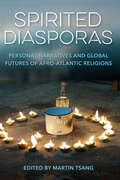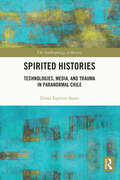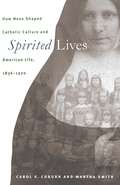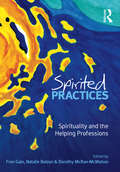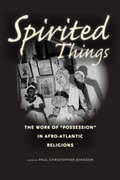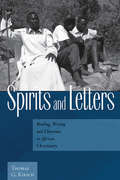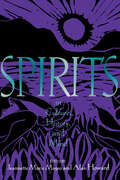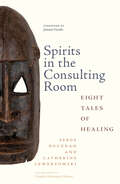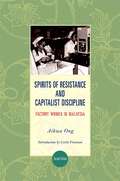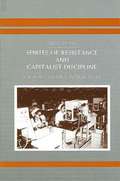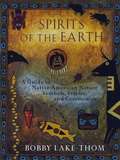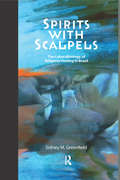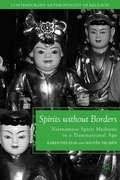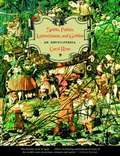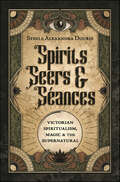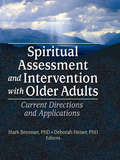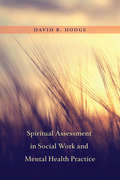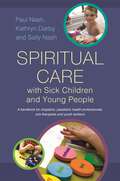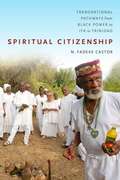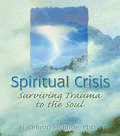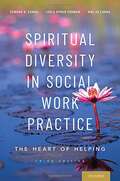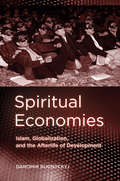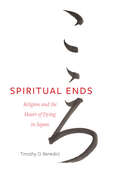- Table View
- List View
Spirited Diasporas: Personal Narratives and Global Futures of Afro-Atlantic Religions
by Martin TsangFirst-person accounts that show the expanding demographics of African-descended religions In this focused portrayal of global dispersal and spiritual sojourning, Martin Tsang draws together first-person accounts of the evolving Afro-Atlantic religious landscape. Spirited Diasporas offers a glimpse into the frequently misunderstood religions of Afro-Cuban Lucumí, Haitian Vodou, and Brazilian Candomblé, adding to the growing research on the transnational yet personal nature of African diasporic religions.In these accounts, practitioners from many origins illustrate the work and commitment they undertook to learn and become initiated in these traditions. They reveal in the process a variety of experiences that are not often documented. Their perspectives also show the expanding contemporary demographics of African-descended religions, many of whose members identify as LGBTQIA+ or are part of other minoritized populations, and they counter inaccurate and often racialized portrayals of these religions as being antimodern and geographically limited. Through the voices of the professionals, scholars, and activists gathered here, readers will appreciate the purpose and belonging to be found in the far-reaching communities of these Latin American and Caribbean spiritualities. As the seekers in these stories discover and come home to their new religious families, Spirited Diasporas displays the relevance and generative power of these traditions.Contributors: Morgan M. Page | Michael Atwood Mason | Eugenia Rainey | Alex Bettencourt | Solimar Otero | Yoshiaki Koshikawa | Belia Mayeno Saavedra | Sue Kucklick-Arencibia | Ivor Miller | Terri-Dawn González | Dr. Martin A. Tsang | Giovanna Capponi | Philippe Charlier
Spirited Histories: Technologies, Media, and Trauma in Paranormal Chile (The Anthropology of History)
by Diana Espírito SantoSpirited Histories combines ethnography with critical theory to provide a sophisticated exploration of the intersection of haunting and the paranormal with technology, media, and history. Retrieving the past in places of trauma and death can take on many facets. One of these is an attention to hauntings, ghosts, and absences that go with the collective experience of loss and disappearance. People memorialize the dead and their stories in myriad ways. But what about the untold stories, or the forgotten, unnamed? This book explores the ways groups of Chilean paranormal investigators and ghost tour operators produce alternate histories using paranormal machinery, rather than simply theatricalizing pain. It offers a look at technologies, machines, and apparatuses – themselves imbued with a long history of supernatural and scientific expectations – and a social analysis of how certain groups of people marshal the voices of the dead to generate particular micro-histories. This fascinating volume will be of interest to a range of disciplines, including anthropology, sociology, history, religious studies, and scholars of technology and new media.
Spirited Lives
by Carol K. Coburn Martha SmithMade doubly marginal by their gender and by their religion, American nuns have rarely been granted serious scholarly attention. Instead, their lives and achievements have been obscured by myths or distorted by stereotypes. Placing nuns into the mainstream of American religious and women's history for the first time, Spirited Lives reveals their critical impact on the development of Catholic culture and, ultimately, the building of American society.Focusing on the Sisters of St. Joseph of Carondelet, one of the largest and most diverse American sisterhoods, Carol Coburn and Martha Smith explore how nuns directly influenced the lives of millions of Americans, both Catholic and non-Catholic, through their work in schools, hospitals, orphanages, and other social service institutions. Far from functioning as passive handmaidens for Catholic clergy and parishes, nuns created, financed, and administered these institutions, struggling with, and at times resisting, male secular and clerical authority. A rich and multifaceted narrative, Spirited Lives illuminates the intersection of gender, religion, and power in nineteenth- and early-twentieth-century America.
Spirited Practices: Spirituality and the helping professions
by Natalie Bolzan Fran Gale Dorothy McRae-McMahonSpirituality and religion are fundamental to all human cultures. Yet in the helping professions, whose shared objective is to promote human well being, questions of spirituality have often been avoided. Now we are increasingly realising that scientific materialism and individuality have failed to meet enduring human needs for meaning and connection. Evidence mounts for the importance of spirituality for prevention and intervention in times of crisis, distress and illness. Many professionals find themselves ill-prepared to respond to the spiritual needs of their clients, and to negotiate encounters with people from unfamiliar faith traditions.Spirited Practices shows how it is possible for professionals to think critically, and be open to spirituality at the same time. Professionals and teachers from diverse faiths and fields of work, including social work, health, psychology and ministry explain how they have integrated spirituality into their work. Spirited Practices is inspiring reading for anyone in the helping professions seeking to develop a spiritually aware practice.'It invites us to look honestly at ourselves and our own practices through learning about those from other professional and faith backgrounds.' Richard Hugman, Professor of Social Work, University of NSW'A much needed forum for practitioners from diverse professional and spiritual backgrounds to address the challenges and rewards of spiritually-sensitive practice.'Leola Dyrud Furman, Associate Professor Emeritus of Social Work, University of North Dakota
Spirited Things: The Work of "Possession" In Afro-Atlantic Religions
by Paul Christopher JohnsonThe word "possession” is anything but transparent, especially as it developed in the context of the African Americas. There it referred variously to spirits, material goods, and people. It served as a watershed term marking both transactions in which people were made into things--via slavery--and ritual events by which the thingification of people was revised. In Spirited Things, Paul Christopher Johnson gathers together essays by leading anthropologists in the Americas that reopen the concept of possession on these two fronts in order to examine the relationship between African religions in the Atlantic and the economies that have historically shaped--and continue to shape--the cultures that practice them. Exploring the way spirit possessions were framed both by material things--including plantations, the Catholic church, the sea, and the phonograph--as well as by the legacy of slavery, they offer a powerful new way of understanding the Atlantic world.
Spirits And Letters
by Thomas G. KirschStudies of religion have a tendency to conceptualise 'the Spirit' and 'the Letter' as mutually exclusive and intrinsically antagonistic. However, the history of religions abounds in cases where charismatic leaders deliberately refer to and make use of writings. This book challenges prevailing scholarly notions of the relationship between 'charisma' and 'institution' by analysing reading and writing practices in contemporary Christianity. Taking up the continuing anthropological interest in Pentecostal-charismatic Christianity, and representing the first book-length treatment of literacy practices among African Christians, this volume explores how church leaders in Zambia refer to the Bible and other religious literature, and how they organise a church bureaucracy in the Pentecostal-charismatic mode. Thus, by examining social processes and conflicts that revolve around the conjunction of Pentecostal-charismatic and literacy practices in Africa, Spirits and Letters reconsiders influential conceptual dichotomies in the social sciences and the humanities and is therefore of interest not only to anthropologists but also to scholars working in the fields of African studies, religious studies, and the sociology of religion.
Spirits in Culture, History and Mind
by Jeannette Marie Mageo Alan HowardSpirits in Culture, History and Mind reintegrates spirits into comparative theories of religion, which have tended to focus on institutionalized forms of belief associated with gods. It brings an historical perspective to culturally patterned experiences with spirits, and examines spirits as a locus of tension between traditional and foreign values. Taking as a point of departure shifting local views of self, nine case studies drawn from Pacific societies analyze religious phenomena at the intersection of social, psychological and historical processes. The varied approaches taken in these case studies provide a richness of perspective, with each lens illuminating different aspects of spirit-related experience. All, however, bring a sense of historical process to bear on psychological and symbolic approaches to religion, shedding new light on the ways spirits relate to other cultural phenomena.
Spirits in the Consulting Room: Eight Tales of Healing (Rutgers Global Health)
by Serge Bouznah Catherine LewertowskiFor any country that has a large and diverse migrant population, it is a struggle to connect these people to the country’s institutions, including the healthcare system, which can be overwhelming in its complexity. Cultural and language barriers often make it difficult for doctors to fully understand the symptoms of their migrant patients, reach accurate diagnoses, or properly treat their suffering. Thus, medical practitioners must attempt new, innovative practices in order to reach patients where they are and convince them to accept treatment from doctors they don’t totally understand. In France, Serge Bouznah and Catherine Lewertowski have pioneered one such practice—that of transcultural mediation. Drawn from two decades of their experience with transcultural mediation, Spirits in the Consulting Room tells the stories of eight patients—mainly migrants—and their families. Each chapter focuses on a different patient, and Christelle, Djibril, Moncef, Alhassane, Jacinthe, Amy, Cyril, Alice, and Pierre leap off the page as distinct people with unique situations. Together, these chapters reveal how patients’ comprehension of their symptoms is shaped by their cultural background, while recounting the challenges of translating that into terms the doctors can grasp. The book shows how trained transcultural mediators can help to redress the power imbalance between doctors and the migrants they treat, providing patients with advocates who respect the authority of their background and experiences and don’t just take the side of the medical professionals. The groundbreaking insights modeled in this book can be applied to any medical situation where doctors and patients find themselves speaking different languages.
Spirits of Resistance and Capitalist Discipline, Second Edition: Factory Women in Malaysia (SUNY series in the Anthropology of Work)
by Aihwa OngIn the two decades since its original publication, Spirits of Resistance and Capitalist Discipline has become an ethnographic classic in the fields of anthropology, labor studies, and gender and globalization studies. Based on anthropological field work in an agricultural district in Selangor, Peninsular Malaysia, Spirits of Resistance captures a moment of profound transformation, illustrated by the disruptions, conflicts, and ambivalences in the lives of Malay women during the rapid industrialization associated with Malaysia's rise as a tiger economy. Aihwa Ong's nuanced approach to the Malay women factory workers' experiences of the contradictions of modern globalized capitalism has inspired subsequent generations of feminist ethnographers in their explorations of key questions of power, resistance, femininities, religious community, and social change. With a new critical introduction by anthropologist Carla Freeman, this new edition of Spirits of Resistance continues to offer an exemplary model of sophisticated analysis of culturally based resistance to the ideology, surveillance, and institutional authority of globalized corporate capitalism.
Spirits of Resistance and Capitalist Discipline: Factory Women in Malaysia
by Aihwa OngAn analysis of the rural conditions and economic status of female workers in the electronic industry in Malaysia.
Spirits of the Earth: A Guide to Native American Nature Symbols, Stories, and Ceremonies
by Robert Lake-ThomMuch of the ancient knowledge that has been passed down from Native American medicine men, or shamans is in danger of being lost. Bobby Lake-Thom, a Native American healer known as Medicine Grizzly Bear, has sought to preserve this powerful heritage by sharing his wisdom and experience learning from the world around us. <P><P>The result is Spirits of the Earth, an extraordinary compilation of legends and rituals about nature's ever-present signs. From the birds that soar above us to the insincts beneath our feet, Bobby Lake-Thom shows how the creatures of the earth can aid us in healing and self-knowledge. What does it mean if a hawk appears in a dream? What are the symbolic interpretations of a deer, a skunk, a raccoon? Lake-Thom, who has studied with the elders of many tribes, explains the significance of animal figures as manifestations of good or evil, and shows how we can develop our own powers of awareness and intuition. The first book of its kind, this practical and enlightening resource includes dozens of fashinating animal myths and legends, as well as exercises and activities that draw upon animal powers for guidance, healing, wisdom, and the expansion of spiritual influences in our lifes. You'll discover here: How animals, birds, and insects act as signs and omens The significance of vision quests How to make and use a medicine wheel The role of spirit symbols--and how they affect the unconscious Excercises for creative dreaming The power of the earth-healing ceremony How to increase your spiritual strength and create sacred spaces And more
Spirits of the Rockies
by Courtney W. MasonThe Banff-Bow Valley in western Alberta is the heart of spiritual and economic life for the Nakoda peoples. While they were displaced from the region by the reserve system and the creation of Canada's first national park, in the twentieth century the Nakoda reasserted their presence in the valley through involvement in regional tourism economies and the Banff Indian Days sporting festivals.Drawing on extensive oral testimony from the Nakoda, supplemented by detailed analysis of archival and visual records, Spirits of the Rockies is a sophisticated account of the situation that these Indigenous communities encountered when they were denied access to the Banff National Park. Courtney W. Mason examines the power relations and racial discourses that dominated the eastern slopes of the Canadian Rocky Mountains and shows how the Nakoda strategically used the Banff Indian Days festivals to gain access to sacred lands and respond to colonial policies designed to repress their cultures.
Spirits with Scalpels: The Cultural Biology of Religious Healing in Brazil
by Sidney M Greenfield“The first time I witnessed a Spiritist surgery, a young man named Jose Carlos Ribeiro inserted a used scalpel taken from a tray that I was holding, and plunged it into the eye of an elderly man. The patient did not move….” Decades of fieldwork later, Sidney Greenfield presents a riveting ethnography of the complex world of religious healing in Brazil that challenges readers to grapple with the most fundamental concepts of anthropology and cross-cultural experience. In a major contribution to cultural biology, he analyses the complex social, economic, and political landscape of Brazil to understand dramatic healing practices that seem to defy medical explanation. This engrossing and provocative book will put students and scholars alike on the edge of their seats.
Spirits without Borders
by Karen Fjelstad Nguyen Thi Hien"Spirits without Borders" is an ethnographic study of the transnational and multicultural expansion of Vietnam's Mother Goddess Religion and its spirit possession ritual. The product of collaborative research by an American anthropologist and a Vietnamese folklorist, the work explores how and why the ritual spread from Vietnam to the US and back again, the impact of ritual transnationalism in both countries, and the current spread of the ritual to non-Vietnamese in the USA. "
Spirits, Fairies, Leprechauns, and Goblins: An Encyclopedia
by Carol Rose3000 alphabetically arranged entries that list the Little People by region and type, and how to deal with them.
Spirits, Seers & Séances: Victorian Spiritualism, Magic & the Supernatural
by Steele Alexandra DourisSpiritualism in the Age of Sherlock Holmes and Edgar Allan PoeA woman wearing a black veil convenes a séance. A magician puts a volunteer into a trance. A fortune-teller leans over a crystal ball. Everyone knows what Victorian mysticism looks like because our modern imagery, language, and practice of magic borrows heavily from the Victorians. But we have little understanding of its spiritual, cultural, and historical foundations.What made the Victorians turn to mediumship, hypnotism, and fortune-telling? What were they afraid of? What were they seeking?This book explores the history of automatic writing, cartomancy, clairvoyance, and more. It reveals how Victorian belief in ghosts, fairies, and nature spirits shaped our celebrations of Halloween and Christmas. With historic examples and hands-on exercises, you will discover how spiritualism in the time of Jack the Ripper, Jane Eyre, "A Christmas Carol," and Dracula left such a profound impact on both the past and present.
Spiritual Assessment and Intervention with Older Adults: Current Directions and Applications
by Mark Brennan Deborah HeiserStay up-to-date with the latest innovative methods of meeting the spiritual needs of the elderly Spiritual Assessment and Intervention: Current Directions and Applications examines current state-of-the-art efforts in the development and implementation of spiritual interventions for older adults. Academics and practitioners working in social work, social welfare, medicine, and mental health and aging present innovative approaches to meeting major challenges in the field of gerontology, including elder abuse, dementia, care giving, palliative care, and intergenerational relationships. The book provides practical methods for dealing with the problems and pitfalls of starting and evaluating interventions of a spiritual nature in a variety of community-based and institutional settings. Spiritual Assessment and Intervention: Current Directions and Applications provides you with an overview of current and future methods and means of providing spiritual support to the elderly as they struggle with the problems and possibilities of aging in today&’s complex world. Growing interest in the positive effects that religiousness and spirituality can have on life stress has created a growing need for research and practice models that strengthen, reinforce, or promote the spiritual well-being of older adults. This collection-first presented in 2003 at the 56th Annual Scientific Meeting of the Gerontological Society of America-addresses the important care giving and practice issues involving the physical and psychological health of older adults.Spiritual Assessment and Intervention: Current Directions and Applications examines: how older adults use narrative therapy to manage adversity and maintain self-efficacy how faith-based communities can be enlisted as important social resources a pilot government-funded project to raise awareness of elder abuse in faith communities an intergenerational project involving a preschool and a retirement community spiritual activities for adults with Alzheimer&’s disease the Creating Alternative Relaxing Environment (CARE) Cabinet intervention Spiritual Assessment and Intervention: Current Directions and Applications is an essential resource for gerontological practitioners from the biological, clinical (including physicians, physician assistants, nurses, and dentists), behavioral and social sciences (including anthropologists, psychologists, social workers, sociologists, and researchers), and for health care administrators.
Spiritual Assessment in Social Work and Mental Health Practice
by David HodgeSpirituality often plays a critical role in health and wellness, yet few have explored in detail the process through which practitioners can identify and use clients' spiritual strengths to their mutual advantage. To address this gap, this practice-oriented text equips helping professionals with the tools they need to administer spiritual assessments ethically and professionally. David R. Hodge outlines a number of assessment approaches, including an implicit method for evaluating "secular" forms of spirituality. Case examples illustrate the implementation of these strategies in different clinical settings and with groups from diverse racial, geographic, and socioeconomic backgrounds.
Spiritual Care with Sick Children and Young People: A handbook for chaplains, paediatric health professionals, arts therapists and youth workers
by Paul Nash Sally Nash Kathryn DarbyExploring both principles and best practice of the spiritual care of sick children and young people, this remarkable and inspiring book equips the reader to think critically and creatively about how to provide care in hospitals, hospices and other care contexts for ill and disabled children. Written for staff from any allied health discipline, the authors explore the potential spiritual needs and issues faced by sick children and young people. They provide evidence-based practice principles, and a range of activity-based interactions that empower the child or young person and expand discussion of meaning and identity. The book includes stories and multidisciplinary practice examples, as well as many ideas; practical activities; discussion of work with families, and also of the various tensions and issues that can emerge. Based on evidence-based practice and research carried out by the Chaplaincy Team at Birmingham Children's Hospital, the book will be helpful and inspiring reading for chaplains, nurses, play and youth workers, therapists and anyone else involved in the care of sick children and young people.
Spiritual Citizenship: Transnational Pathways from Black Power to Ifá in Trinidad
by N. Fadeke CastorIn Spiritual Citizenship N. Fadeke Castor employs the titular concept to illuminate how Ifá/Orisha practices informed by Yoruba cosmology shape local, national, and transnational belonging in African diasporic communities in Trinidad and beyond. Drawing on almost two decades of fieldwork in Trinidad, Castor outlines how the political activism and social upheaval of the 1970s set the stage for African diasporic religions to enter mainstream Trinidadian society. She establishes how the postcolonial performance of Ifá/Orisha practices in Trinidad fosters a sense of belonging that invigorates its practitioners to work toward freedom, equality, and social justice. Demonstrating how spirituality is inextricable from the political project of black liberation, Castor illustrates the ways in which Ifá/Orisha beliefs and practices offer Trinidadians the means to strengthen belonging throughout the diaspora, access past generations, heal historical wounds, and envision a decolonial future.
Spiritual Crisis: Surviving Trauma to the Soul
by J Lebron McbrideIt’s no revelation that in today’s world many people suffer from some form of spiritual crisis. But, fortunately, there is hope. In Spiritual Crisis: Surviving Trauma to the Soul, you’ll discover how you can reverse the impact of spiritual crisis and apply healing balm to the traumatized soul. A comprehensive, real-life approach to spiritual care, it gives you the understanding necessary to put a lid on the daily chaos that seeks to destroy those whose lives have been shattered by tragedy, terror, and disillusionment.Written from the perspective of a compassionate professional who has navigated the dark and turbulent waters of his own spiritual crises, Spiritual Crisis represents a loving cross-section of aid from the fields of pastoral theology, psychology, and health care. Christians and non-Christians alike will benefit from its frank approach to aiding troubled souls through the tough times of belief transition, loss of faith, and potentially damaging extremes in living and thinking. Specifically, you’ll read about: understanding the effects and roots of spiritual crisis and trauma coping with loss counteracting disillusionment with the church negotiating belief transitions dealing with religious burnout intervening in denominational identity crisesOftentimes, it’s hard to know what will make a loved one survive or succumb to the impact of seemingly insurmountable personal emergencies. However, this book is a “call to care” that will enable you to help others turn back the tide of debilitating hardship in their lives and restore the tempering unity of mind and body. Whether you’re a beginning pastoral counselor, a marriage and family therapist, or friend of a troubled loved one, Spiritual Crisis will show you and those you work with how to turn crisis into care.
Spiritual Dimensions of Ageing
by Malcolm Johnson Joanna WalkerOur understandings of both ageing and spirituality are changing rapidly in the twenty-first century, and grasping the significance of later life spirituality is now crucial in the context of extended longevity. Spiritual Dimensions of Ageing will inform and engage those who study or practise in all fields that relate to the lives of older people, especially in social, psychological and health-related domains, but also wherever the maintenance and development of spiritual meaning and purpose are recognised as important for human flourishing. Bringing together an international group of leading scholars across the fields of psychology, theology, history, philosophy, sociology and gerontology, the volume distils the latest advances in research on spirituality and ageing, and engages in vigorous discussion about how we can interpret this learning for the benefit of older people and those who seek to serve and support them.
Spiritual Diversity In Social Work Practice: The Heart Of Helping
by Edward R. Canda Leola Dyrud Furman Hwi-Ja CandaSocial workers and helping professionals serve many people who draw upon religion and spirituality to find meaning, thrive, and overcome oppression and obstacles in their lives. The third edition of Spiritual Diversity in Social Work Practice provides a comprehensive framework of values, knowledge, and skills for spiritually sensitive and culturally appropriate practice with diverse religious and non-religious clients. This classic text contains forty different case examples and stories that vividly illustrate the professional values and ethical principles that guide spiritually sensitive practice. Learning activities at the end of each chapter encourage readers' personal and professional development through self-reflection, dialogue, creative expression, outreach to the community, and skill application. The book also draws connections between spiritual and cultural diversity, gender, and LGBTQI issues. It introduces beliefs, values, and social welfare applications of Buddhism, Christianity, Confucianism, Hinduism, Indigenous spiritual perspectives, Islam, Judaism, Existentialism, and Transpersonal and Deep Ecological Theories. Skills for spiritual assessment and spiritually sensitive practices include mindfulness, meditation, ritual and ceremony, forgiveness, spiritually sensitive administration, and engagement with community-based spiritual support systems. For social workers and other professional helpers committed to supporting the spiritual care of individuals, families, and communities, this definitive guide offers state-of-the-art interdisciplinary and international insights as well as practical tools that students and practitioners alike can put to immediate use.
Spiritual Economies: Islam, Globalization, and the Afterlife of Development (Expertise: Cultures and Technologies of Knowledge)
by Daromir RudnyckyjIn Europe and North America Muslims are often represented in conflict with modernity—but what could be more modern than motivational programs that represent Islamic practice as conducive to business success and personal growth? Daromir Rudnyckyj's innovative and surprising book challenges widespread assumptions about contemporary Islam by showing how moderate Muslims in Southeast Asia are reinterpreting Islam not to reject modernity but to create a "spiritual economy" consisting of practices conducive to globalization.Drawing on more than two years of research in Indonesia, most of which took place at state-owned Krakatau Steel, Rudnyckyj shows how self-styled "spiritual reformers" seek to enhance the Islamic piety of workers across Southeast Asia and beyond. Deploying vivid description and a keen ethnographic sensibility, Rudnyckyj depicts a program called Emotional and Spiritual Quotient (ESQ) training that reconfigures Islamic practice and history to make the religion compatible with principles for corporate success found in Euro-American management texts, self-help manuals, and life-coaching sessions. The prophet Muhammad is represented as a model for a corporate CEO and the five pillars of Islam as directives for self-discipline, personal responsibility, and achieving "win-win" solutions.Spiritual Economies reveals how capitalism and religion are converging in Indonesia and other parts of the developing and developed world. Rudnyckyj offers an alternative to the commonly held view that religious practice serves as a refuge from or means of resistance against modernization and neoliberalism. Moreover, his innovative approach charts new avenues for future research on globalization, religion, and the predicaments of modern life.
Spiritual Ends: Religion and the Heart of Dying in Japan (New Interventions in Japanese Studies #4)
by Timothy O. BenedictA free open access ebook is available upon publication. Learn more at www.luminosoa.org. What role does religion play at the end of life in Japan? Spiritual Ends draws on ethnographic fieldwork and interviews with hospice patients, chaplains, and medical workers to provide an intimate portrayal of how spiritual care is provided to the dying in Japan. Timothy O. Benedict uses both local and cross-cultural perspectives to show how hospice caregivers in Japan are appropriating and reinterpreting global ideas about spirituality and the practice of spiritual care. Benedict relates these findings to a longer story of how Japanese religious groups have pursued vocational roles in medical institutions as a means to demonstrate a so-called "healthy" role in society. By paying attention to how care for the kokoro (heart or mind) is key to the practice of spiritual care, this book enriches conventional understandings of religious identity in Japan while offering a valuable East Asian perspective to global conversations on the ways religion, spirituality, and medicine intersect at death.
